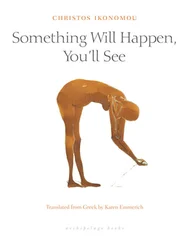Clyde was taking deep, frustrated breaths. Dan sneaked a look at his partner. Could it be that Clyde was lost for words?
‘It’s OK, guys. The last thing Demet and I wanted was to put any pressure on you. We don’t have to talk about it anymore.’
Margarita’s tone was measured. She was making peace. She turned to Demet. ‘It’s OK, mate, we said that there was no need for anyone to make a decision tonight.’
But Demet couldn’t let it go. ‘Exactly what is your problem with having children?’
‘Jesus Christ!’ Clyde started rolling a cigarette. ‘I’m not interested in the middle-class fantasy of being superpoof. I don’t want to get married, I don’t want the responsibility that comes with being a father. It’s fine if that’s what you and Margarita want — no bother. Good luck to you. It’s just not for me.’
The drying pink crusts of dip were fascinating and repulsive to Dan. There was a pressure in his belly, in his bladder. He wanted to say yes to the women, but he didn’t want to say the wrong thing to Clyde. He wouldn’t look up. He was sure they would be glaring at him: his lover, his best friend, her girlfriend. They wanted him to speak.
‘We have to grow up, Clyde.’ Demet’s tone was bruising, callous in its disdain. ‘Being queer doesn’t mean being bloody Peter Pan forever. Wanting to have some responsibility is not middle class.’
‘No? Moralism isn’t middle class?’ Clyde’s tone was equally scornful. ‘Who the fuck do you think you are preaching to me about responsibility and growing up? Don’t think you’re excused because you are some self-declared working-class hero. Having parents who are immigrants doesn’t make you working class, not where I come from. I should take you to Glasgow — I should drop you in the middle of fucken Easterhouse and see how much working-class solidarity they extend to you there.’
He paused to lick the cigarette closed. The slide of his tongue across the paper conveyed his disgust. ‘How long are you going to be dining out on your folks’ experience, appropriating it as your own? You went to university, pal, you’re an academic. What the fuck are you if you’re not middle class?’
Dan shut his eyes. She would fly at Clyde now, she would fling herself at him and strip away his flesh. She would retaliate with all that she was, all of her pride in who she was. She would tear him apart.
Nothing. Dan opened his eyes. Demet’s features had slumped; she was staring at Clyde, slack-jawed, red-faced, punch drunk. He recognised the shame, he read her confusion. And for the first time he got it, how university had shaped and moulded her, how for Demet, university was her own Cunts College.
Clyde couldn’t understand what that loss, that realisation, would have meant to her. Everything he’d said had been true, he had laid her bare: Demet had confidence, vocabulary, manners — she had all that came from opportunity and knowledge. She now lived in a different world: Shelley and Boz and Mia and Yianni, those friendships, that past, that world had gone. She was middle class, and so was Dan. But what Clyde didn’t understand was what Dan and Demet both knew in their bones. Clyde was the son of a pharmacist and a teacher, he’d excelled at a selective comprehensive school, he’d grown up in a part of Glasgow that Dan’s granddad had never visited—‘They didn’t allow our kind there,’ Bill had teased Clyde when the two had first been introduced — he was a cosmopolitan with the freedom of an EU passport, but what Clyde could never understand, because he could never conceive of such a thing, never concede the thought, was that for all Dan and Demet had gained, they both shared the same fear: that middle class wasn’t worth it.
Couldn’t she just look at him? He was desperate for her to look at him. He knew that there would be light between them, a light that they shared. A past from before university and Cunts College.
But Demet was cowed, her bottom lip was quivering. Margarita was about to speak, to allay the tension, to bring their table back to equilibrium. Dan couldn’t let her; Margarita didn’t understand that for all her talk of social justice and human rights — she was still the child of a successful lawyer and a father who was a top public servant — it couldn’t be Margarita who defended Demet, it had to be Dan. It had always been Dan.
He straightened his back, ignored the searing discomfort from his full bladder. Margarita had begun talking but he cut her off, interrupted her without apology, addressing Clyde. ‘That world you’re describing, that world in Glasgow you keep banging on about, you know, that world of council estates and drugs and three generations of unemployment? The one you want to drop me and Dem in? That’s not fucking working class, Clyde. I don’t know what it is but it isn’t working class.’
It worked. It was a sucker punch and it was now Clyde who was deflated. Margarita appeared uncertain and confused, as if Dan’s words were another language. But Demet looked up, he’d made Demet look up. He couldn’t read her expression.
Dan was exhausted. He had to piss.
Clyde quickly recovered, incredulous and incensed. ‘What the fuck are you talking about, pal? If they aren’t working class, who the fuck is?’
Dan understood that it was because he’d defended Demet. It was the schoolyard again and he’d defended Demet. He groped for words that would pacify his lover but would also be loyal to his friend. But words remained dangerous, elusive; he couldn’t move them in the direction of his ideas and notions. He saw himself slicing open boxes and stacking supermarket shelves, smelled how sour and tart his sweat was at the end of an all-night shift; saw his father driving back and forth across the sea of the Nullarbor; saw his mother cutting hair. Someone’s got to cut hair . He thought of Mr Celikoglu’s long years at the Ford plant in Campbellfield, and Mrs Celikoglu’s lifetime as a seamstress and his granddad Bill’s skill as a bricklayer and his nan being a typist: all that labour and exertion and sweat, how the body was moulded and transformed by that work.
He struggled for the words. ‘I don’t know, mate, I don’t know what those people you talk about are, I don’t know them. But they are not my class.’
Clyde and Margarita were still unsatisfied; for them the words were certainly not enough. But Demet was nodding, was mouthing something covertly to him: he catches it, can almost hear it. ‘Thank you.’
His and Demet’s daughter. There was no Clyde, no Margarita — they didn’t belong to his future.
The sounds came rushing back: the sea, the music, the restaurant.
Clyde flicked the rolled cigarette to his mouth. ‘Enough. This was meant to be a holiday.’ But his tone was conciliatory, his ire had vanished. One of his fingers was beating a double-stroke at the small of Dan’s back. ‘I’m going to have a smoke.’ He nodded shyly at Demet. ‘You coming out, mate?’
She didn’t quite let him off the hook; she waited for a tense few seconds to pass. They were all holding their breath. Then she reached for her cigarettes and followed Clyde out to the landing.
Margarita and Dan sat in an uneasy silence, watching their partners outside. Clyde said something to Demet and her response was a raucous laugh.
Margarita visibly relaxed. ‘God, they’re alike, aren’t they?’
Quick to anger, opinionated and loud but also generous.
‘Yes, they are,’ Dan answered.
The pressure from his distended bladder was now acute, he was desperate for the toilet, but he knew it wasn’t the moment to leave Margarita alone. He twisted and shifted in his chair.
The smokers returned and Clyde looped an arm around Dan. ‘So what do you say, Kelly? You up to being a dad? I was just telling Dem that a son of yours would be one handsome lad.’
Читать дальше








